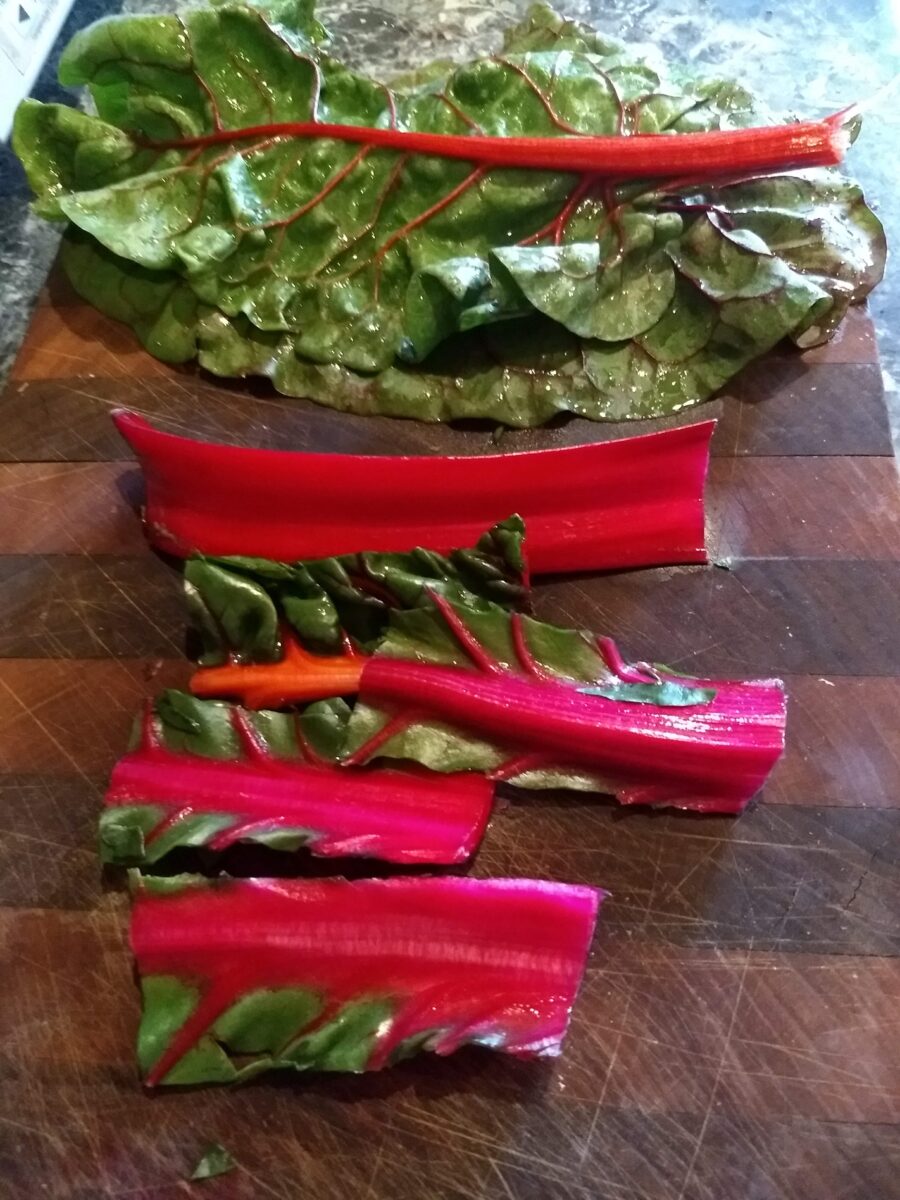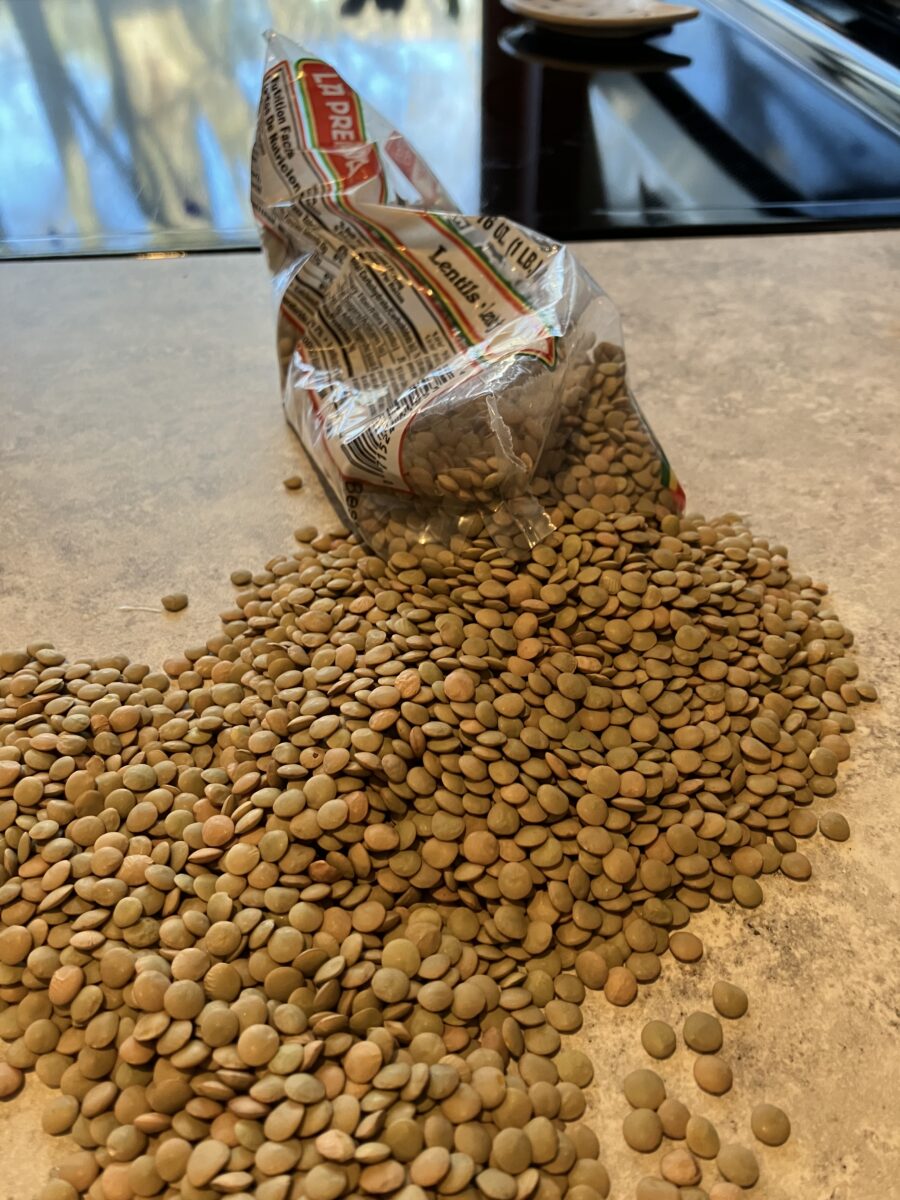Stumbling along with lentils
April 15, 2024
I came to Orthodoxy as an adult, and I will always feel a little like someone peering into windows; maybe I’m on the patio, but not quite inside the building. On the plus side for me, Orthodoxy will always be endlessly fascinating–something not everyone born into this tradition can say. To me it is a deep well where you never hear the pebble hit the water, a thing not quite fully knowable and a little intimidating, a little scary. I’ll probably never get over that slightly outsider feeling, that sense that there are only more mysteries behind the things I finally think I figure out. I guess I can say, I’ve at least been able to figure out the questions.

One thing I have been figuring out slowly, puzzling out the questions, stumbling along, is the Great Fast: the 40 days of Great Lent prior to Easter. For the Orthodox, fasting means: no meat, no dairy, no eggs, no fish except shellfish, no alcohol, and technically, no olive oil. We do this on and off all year long: every Wednesday and Friday, 15 days in June for the Apostles, 15 days prior to the Dormition of Mary in August, all of Advent, and every day for the duration of Lent. Somehow to me this last one is the worst.
Let me just say right here that while I can handle the twice-a-week fasts, I rarely manage the August stint (usually traveling, which gets you off the fasting hook), Advent is up and down (come on! It’s December! What about hot cocoa–or steaming pot pies–or Christmas cookies?!), and the Apostles are altogether uncelebrated by me on principle (um, sorry, Saints Peter and Paul). But the biggie, the most serious one, the Lenten fast, I do undertake each year with a will, and it feels like a long stretch of despair. It’s so disagreeable to me I am prone to whining about it before it’s over. I’ll whine before it starts, to be honest. There are a lot of reasons.



Why can’t I just be happy with beautiful natural things that God made? Plus oil-free hummus? (Go here for that recipe.)
As the one who cooks for the family, there are obviously many dishes I can make that fit within these parameters, but I find them boring. Isn’t almost everything better with a little pat of butter–a little swig of cream–just a titch of homemade chicken broth? What’s more, at our house this meal planning was flabbergasting for decades, a brain-teaser puzzle: I had to somehow incorporate one high-protein, low-carb eating diabetic and another who can’t eat those perennial sources of fasting protein, soy and legumes, at all. As for me, I’m prone to fainting, and whether it’s true or not I seem to have convinced myself that I feel dizzy during these long weeks with no animal protein. And then there’s my…general lack of discipline. In a way that’s never the case at any other time of year, I find myself thinking frequently that I absolutely must get to Culver’s for a butterburger or Portillo’s for a Maxwell Street Polish or I’ll die. While I may not hop in the car and race to Culver’s, I usually do end up falling off the fasting wagon during Lent.
But I’m willing to stick with it, keep trying over and over, because the fast is important. It’s about a lot of things: self-discipline; cutting down on my own consumption and sharing my resources with others; living within boring and tedious parameters joyfully; and confronting the reality that sometimes I have no interest in self-discipline, or sharing, or parameters of any kind. So many exercises, lessons, and truths emerge during these weeks it’s positively dizzying if you pay attention.
But it’s easy not to. Our culture isn’t geared toward abstractions one can gain from what one can’t have. Our culture is oriented around instant access to goods and services. Very little in the typical, before-times, middle-class American’s daily life had been about limits, sacrifice, or discipline. Our markets are tsunamis of abundance. Our big box stores have everything we can think of at low low underpaid-Chinese-factory-worker or prison labor prices. If our gas stations give us expensive gas we get cranky, but there is never a question that the gas will be there.
But then the pandemic came along. We were, all of us, all over the world, learning about different aspects of fasting then, whether we wanted to or not. We had an extended lesson about persisting through deprivations large and small. Stores were missing our favorite things. Supply chain problems made many products disappear for long stretches. Everyone tapped into their inner survivalist, hoarding stockpiles of off-brand necessities or weird things we’d never used before like 15 pounds of chickpea flour, plus all those dried beans that are still hanging around.
As our time living within the parameters of a pandemic stretched into a year, then two, we weren’t merely deprived of goods. Most of us lived in a strange way, cut off from our workplaces, extended families, traditions, celebrations, and friends. But those of us who were cut off just in this way were the lucky ones. Many families were, and are, grieving. Some grieved the loss of several family members to covid. In addition to what the rest of us lost, these families were also severed from their loved ones, their history, and their future.
All those months were truly a long, involuntary, sorrowful fast from everything normal.
We still bear the scars of those strange times but for the most part our access to ready goods and services has been entirely restored. We’re back to well-stocked big box stores, the most abundant and wide-varietied grocery stores in the history of humanity, and instant shipping on literally anything we can think of. So it may have felt like a long fast, and it was, but in its absence all is quickly forgotten and all that’s left is that vague uncomfortable feeling that lingers after a bad dream.
Because this is America. The land of the free. The freely available stuff.
And so, into a culture by nature and purpose set against object lessons in scarcity or deprivation, a culture in which entitlement is our middle name, our fasts step in, heroically trying to teach us what there is to learn from a pantry full of mostly lentils.

For years I tried to amplify the Church’s fasting rules in my own way. For the first night of the Great Fast I would serve my family a pot of lentils and a pot of rice, without even a speck of salt or pepper. “This is what you’d get in 90% of the rest of the world, if you were lucky,” I’d say as I dropped the pots rather savagely onto the table, sans my usual serving dishes. “You should be grateful.” It was years and years before I was able to grasp even a scant thread of what the Greek attitude toward fasting is–and it certainly wasn’t that.
In those years I also presumed I needed to add more strictures to my fast, because of course I did. To the ordinary Lenten fast I would add my own proscriptions on sugar, Starbucks, social media, and eBay. Do you, reader, think I was able to manage all that? Indeed I was not.
I was mired in the wrong conception of fasting–really, of Lent–for years. A twisted-up holdover from my Western past, I guess, with strong reinforcement from my naturally dark, frequently depressed, and generally self-loathing self.
In my old pre-Orthodox life, I had it in my head that Lent was the annual outlet for all the mourning and sorrow of all the world for the entire year. Characterized by sorrow for sin, regret, guilt, and tears. As an inveterate cryer, I found this season to be tailor-made for me. Fasting in this context is basically the just punishment for all the guilt and wrongdoing in the world–one’s own, and everyone else’s. Fasting then to me was going 24 hours with no food at all–sort of a deserved penance. Unsustainable for any length of time, and definitely something that always made me feel worse in a sad season.
Bringing this attitude into my new faith home with its peculiar type of fast, I understood fasting to be necessarily painful and unpleasant; my sense that the Church-imposed strictures were not strict enough for me, necessitating added proscriptions, set me up for greatly increased unpleasantness and a far higher failure rate–placing me right in the center of a swirling vortex of self-recrimination and sending me right down the spiritual drain. This was a circular cycle impossible to extricate myself from. But it made sense to feel like an absolutely terrible moral failure, perpetually unworthy, during Lent. Right?
Apparently, not right.
The Greek attitude toward the Great Fast is, on the contrary, one of joy. The Orthodox welcome the fast as a time to undertake an effort which will bring us closer to God. The first day of Lent is actually a national holiday in Greece. On Clean Monday (that name alone already gives you a sense of this season), families pack a picnic of fasting foods and head outdoors to fly kites.
Actually that’s true. I’m not making it up.
Could there be anything further from my guilt-ladling lesson-teaching flavorless pot of lentils dropped with an angry clunk onto the table?
To this day those kids won’t eat lentils. “They taste like sorrow,” my son says.
Lent in the Orthodox world is understood in a very real sense as Spring. We are preparing for that greatest renewal of life, the resurrection of Christ. Lent is not for self-involved sorrow, self-prescribed penance, or self-flagellation. Lenten practices in this light are more like a workout regimen, undertaken all together, to make us stronger. They help us to gain clarity of vision, insight, and mastery over our bodies (which often master us, as I know well as a very food-motivated person). They can help us to reconsider our typical unthinking habits and examine whether we can strive to align those habits better with our values–giving more, wasting less, being more mindful and thankful.
Fasting can demonstrate how much or how little we actually depend on God for our contentment–as opposed to our consumer comforts. Somehow limiting what I partake, according to someone else’s rules, makes me feel like a little kid–one prone to tantrums when I don’t get my way. It’s fascinating to examine how cranky I can get when I want something and remember I can’t have it. How dependent my mood is on having what I want. What makes me comfortable. Is it possible to live in a more realistic, less entitled way? Fasting introduces me to this problem and encourages me to work through that.
This sense of feeling like a little kid illumines another aspect of the fast. It can be a tool to help us realize how little actual autonomy we have in the cosmic sense. We go about all our daily business with some understanding, some knowledge that we maintain control over much of our lives and experiences. But this is, of course, illusory. The best we can manage is to exercise some measure of control over our responses to what happens around us and to us. Fastening our well-being onto the fanciful notion of some perceived control over our lives results in both deep self-delusion and deep unhappiness when things don’t work out according to plan. The fast–eating in a way we don’t want to according to someone else’s rules–is like a little flannel-gram lesson that we can’t control everything. Or much of anything. It asks us to accept that, and flourish anyway.
If it’s so fruitful, so rooted in joy, and so illustrative of great truths, why do I still hate fasting?
Honestly, I just hate following rules.
I hate inconvenience–having to go out of my way to follow aforementioned hated rules.
I hate not having what I want.
And I really hate cooking terrible food. I mean–wouldn’t this taste so much better with just a couple of tablespoons of butter? Who would see that I did that? Such I am reduced to, on occasion, during the Great Fast. Thus it is that our secret moral heart, so often distracted by delicious irrelevancies, is revealed to ourselves and our Maker in trifling dribs and drabs.
But I’m getting better at understanding all this, 28 years in. (What can I say, I’m a slow learner.) And I’m getting a little better at practicing it. There are so many opportunities to stumble and fail, and I never have made it through a Lenten fast without doing that. Still my tradition, priests, and fathers and mothers of the church all rally around, cheering me along: you’ve got this! Keep trying! Get up, get back on track!
And if I haven’t gotten the fasting thing perfected, I’m at least headed toward, I think, the proper questions. Can I–can we–live in contentment, or even joy, if we do not have access to everything we think we need, or want, when we want it? And can we accept the grace that still embraces us even if our answer to that question is no?
Rosemary lentils and greens on toast
I really like this recipe. Also little kids seem to like it. You might not even notice you’re fasting when you eat this. It’s from the Sep/Oct 2013 issue of Eating Well, a magazine that is a splendid source of very tasty recipes.
3 cloves garlic
2 tablespoons oil (oops, oh well)
½ teaspoon crushed red pepper
2 tablespoons tomato paste
2 teaspoons chopped fresh rosemary
4 cups water
1 cup lentils
8 cups chopped kale (I’ve made this with half that amount and it was fine)
4 slices dry crusty good bread
Mince garlic, and add it and crushed red pepper to 2 tablespoons oil in a deep pan over medium heat. Stir and cook for one minute. Add tomato paste and rosemary and cook, still stirring, for one minute. Add water, bring to a boil. Add lentils. Reduce heat to a simmer, partially cover, and cook for 40 minutes. Add kale and salt, cover and cook, stirring occasionally, until lentils and kale are tender, about 10 minutes more.
Toast the bread, then rub with cut-open garlic clove. Serve each toast topped with 1 cup of lentil mixture.
a.) this sounds delicious. b.) i am going to muse all day on the idea that Lenten fasting is full of joy, and that — blessedly — it draws us closer to God.
I know, it’s weird, right?
Thanks for reading, commenting, and contemplating my dear bam!
I grew up Catholic and continued all the traditions while raising my family. But, after they left home I get quite lax…became a holiday, holy-day, weddings and funeral Catholic, and now I’m just a wedding and funeral Catholic.
But, what is fascinating to me is: I still practice Lent…no meat Fridays, fasting and no meat on Ash Wednesday, etc. I even give up chocolate!
This stuff goes deep! I love that you still do this–it must play a positive role for you in some regard, not just the negative one of “giving up.” I had no childhood practice of religion or church related anything, and part of what I appreciate now about participation in Orthodoxy is the way it, like other forms of Christian practice, kind of orders time and offers structure, and that’s another thing I feel intuitively about fasting. Thanks for reading and commenting, June!
I told Steve about your latest essay gem, and he laughed heartily at the line, “They taste like sorrow.”
Beautifully written, and deeply thought provoking. I had just read an essay full of Scripture referencing why communion is to be a celebratory feast, not a funereal meal. So your thoughts on fasting with a joyful heart resonated with truth for me.
Thank you, Julie.
Yeah that line gets me every time I think of it, Elisabeth. LOL! I’d love to read the essay you mentioned–could you email it to me? So fun when random things we read kind of dovetail in thought provoking ways. Thanks for stopping by and sharing your thoughts.
I just read this after returning from Presanctified Liturgy (Wednesdays during Great Lent), to which I brought mujadara for the potluck–Lebanese lentils and rice with crispy onions. We’re all eating lentils! (This recipe definitely has olive oil, and it reminds me of cozy slippers and a warm hug, definitely not sorrow 😉 Thanks for the beautiful reflection, Julie!
Now you’ve got me thinking about crispy onions. Mujadara is *definitely* not sorrowful! I love that you liken it to slippers and a hug–fasting food should be simple yet happy-making I think. Thanks for reading and commenting Shannon! Perhaps you’ll consider sharing your recipe?